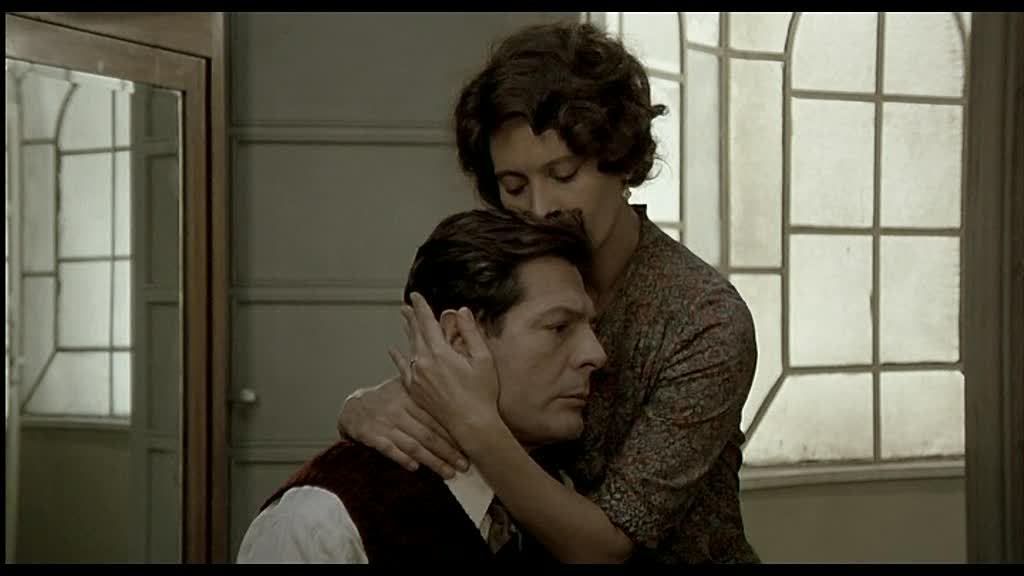Lucas
Versantvoort / October 23, 2014
A special
film about a special day. After five minutes of archival footage of Hitler
arriving in Italy to greet Mussolini, footage that makes it quite obvious where
Chaplin got his inspiration from for The
Great Dictator, the first shot immediately encapsulates the oppressive
nature of fascism and includes a veiled criticism. There’s a low angle shot of
an apartment complex which blocks out all activities going on outside of it. Swastika
flags and flags of Italy are being hung out in celebration of Hitler’s visit to
Italy and then, in what has to be moment of subtle criticism, a man takes out
his trash and dumps it in a nearby container while someone else in the
background hangs up a flag of Italy and Germany. The act of emptying a garbage
bag is visually similar to hanging up a flag, so it seems like director Scola
is comparing fascism to trash. A very nice touch and that’s just the first
shot.
It is the day of the parade in
celebration of Hitler’s arrival in Italy, but what we see is the rundown
apartment complex. We enter one of the apartments to see Antonietta (Sophia
Loren) waking up and – in one long shot – proceeding to wake up her kids (all
six of them). In a Neorealist manner, we see the family’s morning routine, as
Antonietta keeps bumping her head against the kitchen lamp, one of her sons draws
a moustache on his face to appear more masculine in preparation for the parade,
another son secretly smokes in the bathroom and, typically, the husband is
revealed as the most juvenile of them all, as he’s the last one to be woken up.
Eventually, everyone except Antonietta leaves for the parade, while she’s
expected to take care of the house. The pet bird escapes, of course symbolizing
her subconscious desire to escape, and lands near a man’s window. She rings his
doorbell and asks for help. Unbeknownst to her, the man, Gabriele (Marcello
Mastroianni), is a homosexual who was recently fired at the radio station he
worked at for his ‘way of life’ and his beliefs. In fact, her ringing the
doorbell is what literally stops him from committing suicide. They catch the
bird and briefly converse and eventually she leaves. Suddenly feeling inspired,
he decides to pay her a visit, realizing it’s about to be a special day. The
rest of the film chronicles their ever developing relationship.
 | |
| [Patriotic music plays] |
In terms of its story, Giornata has a lot in common with David
Lean’s Brief Encounter. The major
difference is obviously the role fascism plays in every aspect of this film.
From the drab setting, to the fascist zeitgeist, to the overwhelming presence
of masculine behavior, Giornata
paints a world where fascism seems there to stay, a sense that’s only bolstered
by the nationalist anthems the janitor is playing full blast on her radio ad infinitum and ad nauseam. Indeed, one of the best things about the film is how
the ever-present radio provides a harrowing backdrop to the tender relationship
between the two leads. Don’t make the mistake, however, of thinking this film
is depressing. There are countless wonderful details in the depiction of
Antonietta and Gabriele’s relationship. When she notices part of her stockings
is wet, she pulls it under her toes so he won’t notice. When he’s grinding
coffee beans, she quickly retreats to the bathroom to apply some makeup; she
grabs the lipstick, but realizing that would be way too obvious she leaves it
and pulls one of her curls across her face and squeezes her cheeks to inject
some color. All these little details bring out the Brief Encounter-esque character of the film and it’s all the better
for it.
And let’s not forget the
performances with both actors being cast against type. Sophia Loren was of
course a 20th century icon, incredibly famous, so for her to take on
a role as down to earth as this was daring to say the least. Though I’m no
Loren expert, when I think of her, the word that springs to mind is ‘vibrant’,
the exact opposite of Antonietta who only laughs once in the entire film, wears
no makeup and looks tired all the while having to display a subtle
dissatisfaction with her life with Gabriele symbolizing the possibility of
escape. The same goes for Mastroianni. Though a famous leading man (having
worked repeatedly with Fellini), here he plays a homosexual in fascist Italy. Mastroianni
elicits a lot of sympathy and, most importantly, doesn’t overplay the gayness
factor. He doesn’t prance around or anything. It's far cry from the clichés
that saturated early Hollywood films. Instead, Gabriele’s little outbursts of
joy, like him riding a wooden mini-scooter through Antonietta’s apartment,
symbolize a desire to break free of a restrictive fascist regime that has no place for him. Bottom line
is that if you like Brief Encounter and
its subtle, human exploration of relationships, you will by definition like Una Giornata Particolare.

